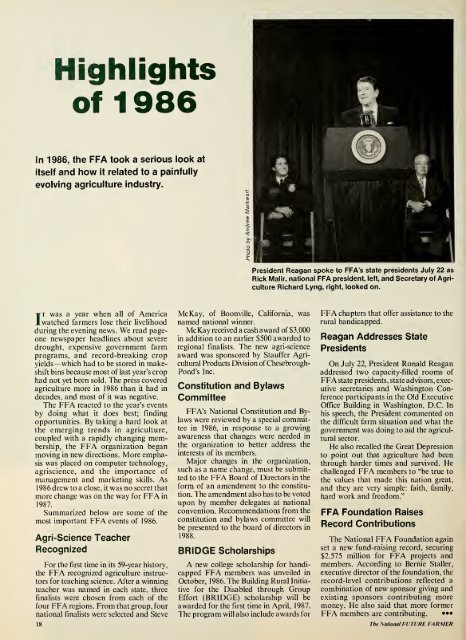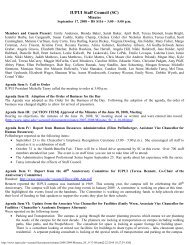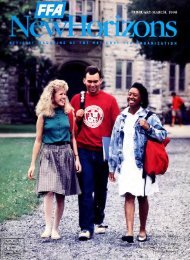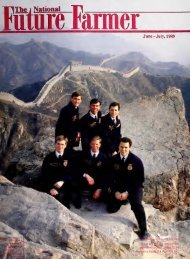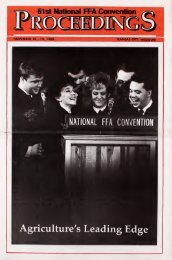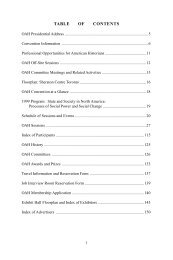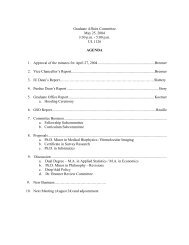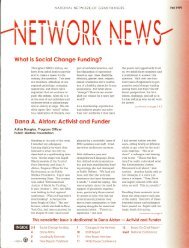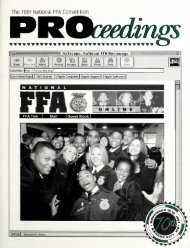National Future Farmer
National Future Farmer
National Future Farmer
Create successful ePaper yourself
Turn your PDF publications into a flip-book with our unique Google optimized e-Paper software.
Highlights<br />
of 1 986<br />
In 1986, the FFA took a serious look at<br />
itself and how it related to a painfully<br />
evolving agriculture industry.<br />
was a year when all of America<br />
IT<br />
watched farmers lose their livelihood<br />
during the evening news. We read pageone<br />
newspaper headhnes about severe<br />
drought, expensive government farm<br />
programs, and record-breaking crop<br />
yields—which had to be stored in makeshift<br />
bins because most of last year's crop<br />
had not yet been sold. The press covered<br />
agriculture more in 1986 than it had in<br />
decades, and most of it was negative.<br />
The FFA reacted to the year's events<br />
by doing what it does best; finding<br />
opportunities. By taking a hard look at<br />
the emerging trends in agriculture,<br />
coupled with a rapidly changing membership,<br />
the FFA organization began<br />
moving in new directions. More emphasis<br />
was placed on computer technology,<br />
agriscience, and the importance of<br />
management and marketing skills. As<br />
1 986 drew to a close, it was no secret that<br />
more change was on the way for FFA in<br />
1987.<br />
Summarized below are some of the<br />
most important FFA events of 1986.<br />
Agri-Science Teacher<br />
Recognized<br />
For the first time in its 59-year history,<br />
the FFA recognized agriculture instructors<br />
for teaching science. After a winning<br />
teacher was named in each state, three<br />
finalists were chosen from each of the<br />
four FFA regions. From that group, four<br />
national finalists were selected and Steve<br />
McKay, of Boonville, California, was<br />
named national winner.<br />
Mc Kay received a cash award of $3,000<br />
in addition to an earlier $500 awarded to<br />
regional finalists. The new agri-science<br />
award was sponsored by Stauffer Agricultural<br />
Products Division of Chesebrough-<br />
Pond's Inc.<br />
Constitution and Bylaws<br />
Committee<br />
FFA's <strong>National</strong> Constitution and Bylaws<br />
were reviewed by a special committee<br />
in 1986, in response to a growing<br />
awareness that changes were needed in<br />
the organization to better address the<br />
interests of its members.<br />
Major changes in the organization,<br />
such as a name change, must be submit-<br />
ted to the FFA Board of Directors in the<br />
form of an amendment to the constitution.<br />
The amendment also has to be voted<br />
upon by member delegates at national<br />
convention. Recommendations from the<br />
constitution and bylaws committee will<br />
be presented to the board of directors in<br />
1988.<br />
BRIDGE Scholarships<br />
A new college scholarship for handicapped<br />
FFA members was unveiled in<br />
October, 1 986. The Building Rural Initiative<br />
for the Disabled through Group<br />
Effort (BRIDGE) scholarship will be<br />
awarded for the first time in April, 1987.<br />
The program will also include awards for<br />
President Reagan spoke to FFA's state presidents July 22 as<br />
Rick Malir, national FFA president, left, and Secretary of Agri-<br />
culture Richard Lyng, right, looked on.<br />
FFA chapters that offer assistance to the<br />
rural handicapped.<br />
Reagan Addresses State<br />
Presidents<br />
On July 22, President Ronald Reagan<br />
addressed two capacity-filled rooms of<br />
FFA state presidents, state advisors, executive<br />
secretaries and Washington Conference<br />
participants in the Old Executive<br />
Office Building in Washington, D.C. In<br />
his speech, the President commented on<br />
the difficult farm situafion and what the<br />
government was doing to aid the agricul-<br />
tural sector.<br />
He also recalled the Great Depression<br />
to point out that agriculture had been<br />
through harder times and survived. He<br />
challenged FFA members to "be true to<br />
the values that made this nation great,<br />
and they are very simple: faith, family,<br />
hard work and freedom."<br />
FFA Foundation Raises<br />
Record Contributions<br />
The <strong>National</strong> FFA Foundation again<br />
set a new fund-raising record, securing<br />
$2,575 million for FFA projects and<br />
members. According to Bernie Staller,<br />
executive director of the foundation, the<br />
record-level contributions reflected a<br />
combination of new sponsor giving and<br />
existing sponsors contributing more<br />
money. He also said that more former<br />
FFA members are contributing. •••<br />
The <strong>National</strong> FVTVRE FARMER


